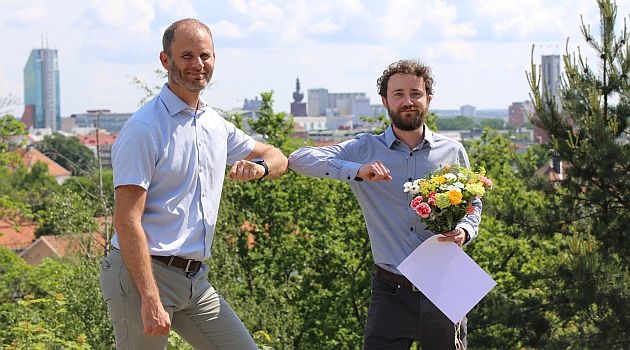Uppsala student lauded by ABB for energy solution
Carl Hedman, a student in the Master's Programme in Energy Systems Engineering, recently won the first round of the ABB Sustainability Challenge for his entry Charge per Energy. “I presented a simple and feasible concept but, perhaps most importantly, a concept that met the requirement of contributing to reducing global energy consumption,” says Carl Hedman.
Part of ABB’s Energy Efficiency Movement, this spring’s competition attracted 36 entrants from Swedish higher education institutions. The theme was sustainable solutions for a better world, with the focus on minimising energy consumption and reducing the environmental impact of motors, generators and propulsion systems.
According to ABB Motion, the aim was to engage students in energy issues while at the same time demonstrating job opportunities available in the process and manufacturing industries in which ABB operates. The winning entry, Charge per Energy, is based on charging customers a fee per megawatt hour for the use of an electric motor, instead of owning a motor. According to Carl Hedman, this will mean that energy-efficient motors will reach the market more quickly.
“The idea is that ABB will lease the customer a more efficient motor instead of the customer buying their own. This transfers the financial risk from the customer to ABB. The fee per megawatt hour can be adjusted to ensure that the customer’s running costs remain unchanged. At the same time, the customer gets greater value for money as the new motors will have a higher availability factor (the installed power is available for a greater percentage of the time, ed.).”
International energy efficiency requirements
A motor with higher efficiency will generally operate at a lower temperature, increasing the working life of the system. The concept also helps to meet increasing demands for energy efficiency from society and the market, in the EU expressed in International Energy efficiency (IE) classes.
Carl Hedman’s entry was partly inspired by visiting lecturers to the Energy Systems Engineering programme.
“Some visiting lecturers from the industry have described the risks involved in excessive costs when investing in fuel production plants. They want to reduce the initial capital investment in getting production up and running. My point of departure was: can we reduce the financial risk so that motors reach the market more quickly?”
Incentive to replace old engine with new one
As a concept, Charge per Energy was a perfect fit for ABB’s Energy Efficiency Movement, which among other things advocates that increased efficiency will relatively quickly repay higher initial investment costs. While broader mapping is required, Carl Hedman believes that when marginal cost pricing is applied to electricity – with electricity generally becoming more expensive the more combustion there is in the energy mix – the worse the energy mix is, the greater financial and environmental benefits offered by Charge per Energy will be. This is because the value of the electricity that did not need to be consumed will be higher, allowing a higher fee to be charged for the motor per megawatt hour.
“Areas with a poorer energy mix are more likely to lack more stringent environmental requirements. This increases the likelihood that older engines will be present in these areas. It can become a bit of a "if I don't have to upgrade my engine, I won't because it costs money". In this way, Charge per Energy may be the bridge needed to overcome the lack of tough environmental and efficiency requirements," says Carl Hedman.
During his presentation for the competition, he reported one example in which the repayment period for Charge per Energy was estimated at five years.
“While it is possible to find configurations that provide much shorter repayment periods, this example gave an idea of the scale of the repayment period,” says Carl Hedman.
Summer job arranged for 2022
First prize in the competition was a summer job with ABB Motion in Västerås. However, as Carl Hedman had already arranged to work at Svenska kraftnät, the authority responsible for Sweden’s national grid, the job at ABB will have to wait until summer 2022. During the upcoming final year on the master’s programme, Carl will be taking the opportunity to read relevant courses, including one on generator design. However, a course taken during the spring nourished another potential dream for the future.
“I attended the course ‘Wave Power: Technology and Systems’ led by Malin Göteman and it was really great! Wave power is really exciting, still a bit like the Wild West. It has yet to completely converge. So, it would be fantastic to be involved in its development.”
Anneli Björkman

